Related Research Articles
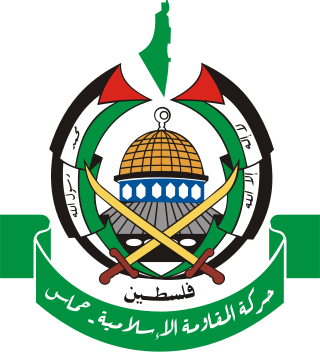
The Islamic Resistance Movement, abbreviated Hamas, is a Palestinian nationalist Sunni Islamist political organisation with a military wing called the Izz al-Din al-Qassam Brigades. It has governed the Israeli-occupied Gaza Strip since 2007.
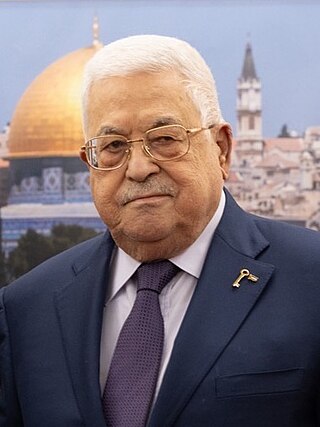
Mahmoud Abbas, also known by the kunya Abu Mazen, is a Palestinian politician who is the president of the State of Palestine and the Palestinian National Authority (PNA). He has been the chairman of the Palestine Liberation Organization (PLO) since 2004, PNA president since January 2005, and State of Palestine president since May 2005. Abbas is also a member of the Fatah party and was elected chairman in 2009.
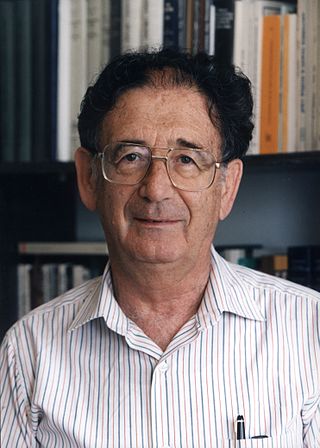
Yehuda Bauer was a Czech-born Israeli historian and scholar of the Holocaust. He was a professor of Holocaust studies at the Avraham Harman Institute of Contemporary Jewry at the Hebrew University of Jerusalem.

Germany–Israel relations are the diplomatic relationship between the Federal Republic of Germany and the State of Israel. After the end of World War II and the Holocaust, relations gradually thawed as West Germany offered to pay reparations to Israel in 1952 and diplomatic relations were officially established in 1965. Nonetheless, a deep mistrust of the German people remained widespread in Israel and the Jewish diaspora communities worldwide for many years after. Relations between East Germany and Israel never materialised. Israel and Germany now maintain a "special relationship" based on shared beliefs, Western values, and a combination of historical perspectives. Among the most important factors in their relations is Nazi Germany's genocide of Jews in Europe during the Holocaust.
Holocaust trivialization refers to any comparison or analogy that diminishes the scale and severity of the atrocities committed by Nazi Germany during the Holocaust. The Wiesel Commission defined trivialization as the abusive use of comparisons with the aim of minimizing the Holocaust and banalizing its atrocities.

Norman Gary Finkelstein is an American political scientist and activist. His primary fields of research are the politics of the Holocaust and the Israeli–Palestinian conflict.
The notion of a Second Holocaust is an assertion that the Holocaust or a similar event is recurring or will recur. It is often used to discuss real or perceived threats to the State of Israel, the Jewish people, or the Jewish way of life.
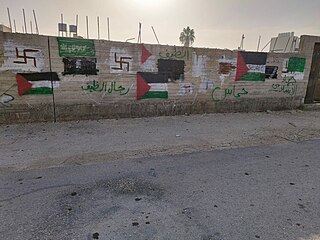
Racism in the Palestinian territories encompasses all forms and manifestations of racism experienced in the Palestinian Territories, of the West Bank, Gaza, and East Jerusalem, irrespective of the religion, colour, creed, or ethnic origin of the perpetrator and victim, or their citizenship, residency, or visitor status. It may refer to Jewish settler attitudes regarding Palestinians as well as Palestinian attitudes to Jews and the settlement enterprise undertaken in their name.

Since the founding of the State of Israel in 1948, a number of countries and individuals have challenged its political legitimacy, its occupation of Arab territories, or both. Over the course of the Arab–Israeli conflict, the country's authority has been questioned on a number of fronts. Critics of Israel may be motivated by their opposition to the country's right to exist or, since the 1967 Arab–Israeli War, their disapproval of the established power structure within the Israeli-occupied territories. Increasingly, Israel has been accused of apartheid. Israel regards such criticism as an attempt to de-legitimize it.
Belgium is a European country with a Jewish population of approximately 35,000 out of a total population of about 11.4 million. It is among the countries experiencing an increase in both antisemitic attitudes and in physical attacks on Jews.
Aside from its use of political violence in pursuit of its goals, the Palestinian political and military organization Hamas has been widely criticised for a variety of reasons, including its alleged use of hate speech by its representatives, alleged use of human shields and child combatants as part of its military operations, alleged restriction of political freedoms within the Gaza Strip, and alleged human rights abuses.
Antisemitism is a growing problem in 21st-century Germany.

Comparisons between Israel and Nazi Germany, sometimes called Holocaust inversion, occur frequently in the political discourse of anti-Zionism. Given the legacy of the Holocaust, the legitimacy of and intent behind these accusations are a matter of debate, particularly with regard to their potential nature as a manifestation of antisemitism. Historically, figures like British historian Arnold J. Toynbee have drawn parallels or alleged a relationship between Zionism and Nazism; British professor David Feldman suggests that these comparisons are often rhetorical tools without specific antisemitic intent. French philosopher Bernard-Henri Lévy argues that such comparisons not only lack historical and moral equivalence, but also risk inciting anti-Jewish sentiment.

The Holocaust and the Nakba have been regarded as interrelated events in discussions of the Israeli–Palestinian conflict, both historically and in the way these two tragedies have influenced perceptions of the conflict by both parties. In Israel, all Israeli Jews are considered survivors of the Holocaust who must implement the imperative of never again in regards to being a Jewish victim. The uniqueness of the Holocaust is emphasized and linkage between it and the Nakba is often rejected. The 2018 book The Holocaust and the Nakba argues that "unless we can hold these two moments in our hearts and minds as part of the same story, there can be no moving forward in the seemingly unmovable conflict that is Israel-Palestine".
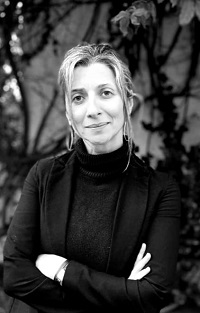
Francesca P. Albanese is an Italian international lawyer and academic. On 1 May 2022, she was appointed United Nations (UN) Special Rapporteur on the occupied Palestinian territories for a three-year term. She is the first woman to hold the position.

The State of Israel has been accused of carrying out a genocide against Palestinians at various times during the longstanding Israeli–Palestinian conflict. Debate on whether Israel's treatment of Palestinians since the Nakba meets the definition of genocide is ongoing; and whether such actions are continuous or limited to specific periods or events. This treatment has also been characterised as "slow-motion genocide", as well as a corollary or expression of settler colonialism and indigenous land theft.

There have been explicit or implicit expressions, statements, and rhetoric made by individuals, political entities, and factions within Arab, and Islamic discourse advocating for the elimination of the State of Israel as a political entity. These calls often involve the use of strong language, genocidal threats, or declarations aiming at the complete eradication of Israel. Such expressions may be manifested in official statements, speeches, charters, or public discourse, reflecting a position that denies the legitimacy of Israel's existence and seeks its destruction through various means, including military or other forms of political and ideological action.

Allegations have been made that the 2023 Hamas-led attack on Israel constituted a genocidal massacre against Israelis. In the course of the assault, Palestinian militants attacked communities, a music festival, and military bases in the region of southern Israel known as the Gaza Envelope. The attack resulted in the deaths of 1,163 Israelis and foreigners, two thirds of whom were civilians.

Experts, governments, United Nations agencies, and non-governmental organisations have accused Israel of carrying out a genocide against the Palestinian people during its invasion and bombing of the Gaza Strip in the ongoing Israel–Hamas war. Various observers, including Francesca Albanese, have cited statements by senior Israeli officials that may indicate an "intent to destroy" Gaza's population, a necessary condition for the legal threshold of genocide to be met. A majority of mostly US-based Middle East scholars believe Israel's actions in Gaza were intended to make it uninhabitable for Palestinians, and 75% of them say Israel's actions in Gaza constitute either "major war crimes akin to genocide" or "genocide".
Jews and Israelis as animals in Palestinian discourse refers to the language and imagery that are encountered in Palestinian narratives that zoomorphically portray Jews and Israelis as members of non-human species that are considered lowly or loathsome. This kind of dehumanization is commonplace on both sides of the Israeli-Palestinian conflict.
References
- ↑ "Prof. Amos Goldberg". The Van Leer Jerusalem Institute. Retrieved 17 April 2022.
- 1 2 "Amos Goldberg: 'What is happening in Gaza is a genocide because Gaza does not exist anymore'" . Le Monde . 29 October 2024. Retrieved 29 October 2024.
- ↑ Welle (www.dw.com), Deutsche. "The Jerusalem Declaration: redefining antisemitism? | DW | 17 June 2021". DW.COM. Retrieved 17 April 2022.
- ↑ Feroz, Elias. "Israeli Historian: This Is Exactly What Genocide Looks Like". Jacobin . Archived from the original on 23 July 2024. Retrieved 25 August 2024.
- ↑ "'Yes, it is genocide' in Gaza says Israeli professor of Holocaust studies". Middle East Monitor . 30 April 2024. Archived from the original on 30 April 2024. Retrieved 25 August 2024.
- ↑ Project, The Palestine (18 April 2024). "Yes, it is genocide". Medium. Retrieved 28 April 2024.
- ↑ מקומית, שיחה (17 April 2024). "כן, זה רצח עם". שיחה מקומית (in Hebrew). Retrieved 29 April 2024.
- ↑ Gilbert, Shirli (April 2019). "Amos Goldberg, Trauma in First Person: Diary Writing During the Holocaust". Psychoanalysis and History. 21 (1): 127–130. doi:10.3366/pah.2019.0288.
- ↑ Budryte, Dovile (2021). "Trauma in First Person: Diary Writing During the Holocaust by Amos Goldberg (review)". Holocaust and Genocide Studies. 35 (1): 106–108. ISSN 1476-7937.
- ↑ "Trauma in First Person". Reading Religion.